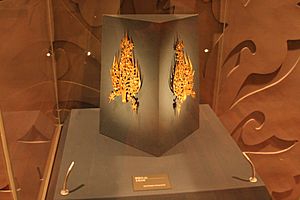Muryeong of Baekje facts for kids
| Muryeong of Baekje | |
| Hangul |
무령왕, 무녕왕, 무영왕
|
|---|---|
| Hanja |
武寧王
|
| Revised Romanization | Muryeong-wang, Munyeong-wang, Muyeong-wang |
| McCune–Reischauer | Muryǒng-wang, Munyǒng-wang, Muyǒng-wang |
Quick facts for kids Birth name |
|
| Hangul |
사마, 융
|
| Hanja |
斯摩, 隆
|
| Revised Romanization | Sama, Yung |
| McCune–Reischauer | Sama, Yung |
King Muryeong (born 462, died 523, ruled 501–523) was the 25th king of Baekje. Baekje was one of the Three Kingdoms of Korea, which were powerful kingdoms in ancient Korea. During his time as king, Baekje worked with Silla against Goguryeo. He also made stronger connections with China and Japan.
Contents
Who Was King Muryeong?
King Muryeong was a very important ruler in Baekje history. His tomb calls him King Sama. It also says he was born in the year 462.
The Samguk Sagi, an old Korean history book, calls him King Muryeong. His personal name was Sama. He was the second son of the 24th king, King Dongseong. King Muryeong became king after King Dongseong passed away. The next year, King Muryeong stopped a planned uprising by a court official named Baekga.
Other Historical Records
Old records from China, called the Liang shu, say his family name was Yeo and his personal name was Yung. These records show that he helped Baekje become a strong nation again.
Japan's Nihonshoki, another historical book, says he was born in 461. It also says he was the son of the 21st king, King Gaero. The book tells a story that his mother gave birth to him on a small Japanese island. Because of this, he was sometimes called Semakishi or King Shima in Japanese records. "Shima" means "island" in Japanese.
King Muryeong's Time as Ruler
King Muryeong was a strong leader. In 501, he sent his army to attack a place called Sugok-seong, which belonged to Goguryeo. He also defended Baekje from attacks. In 503, he stopped an attack by the Mohe. In 507, he successfully fought off another attack from Goguryeo and Mohe forces.
In 512, Goguryeo took over two of Baekje's castles. But King Muryeong himself led 3,000 soldiers to defeat the Goguryeo army. In 523, he ordered a strong wall to be built to protect the northern border of Baekje.
During King Muryeong's rule, Baekje traded and connected more with China. In 512, he sent Baekje's first group of representatives to China's new Liang Dynasty. He sent another group in 521. This group told the Chinese emperor about Baekje's victories over Goguryeo. The Chinese emperor was impressed. He gave King Muryeong special titles, like "Great General Tranquilizing the East" and "King of Baekje." These titles were even found written on a stone tablet in King Muryeong's tomb.
King Muryeong also sent gifts and scholars to Japan. In 503, he sent a bronze mirror. In 513 and 516, he sent Confucian scholars. These scholars helped share knowledge and culture with Japan.
King Muryeong's Lasting Impact
In 1971, King Muryeong's tomb was discovered. It was found in Songsan-ri, a place called Gongju in South Korea. He was buried there with his queen. This discovery was very important. It helped historians learn a lot about Baekje's history and culture.
In 2001, Japan's emperor Akihito spoke about King Muryeong. He said he felt a connection to Korea. This was because old Japanese records say that the mother of a Japanese emperor, Emperor Kanmu, was a descendant of King Muryeong. This was the first time a Japanese emperor publicly mentioned a Korean connection in their family line.
Family of King Muryeong
- Father: Dongseong of Baekje
- Mother: Not known
- Unnamed Queen
- 1st son: Seong of Baekje (died 554) – He became the 26th King of Baekje.
- 2nd son: Prince Junda (died 513) – He lived in Japan. Many people in Japan trace their family back to him.
- 3rd son: Shigakishi – He was sent to Japan in 505.
King Muryeong in Popular Culture
- An actor named Lee Jae-ryong played King Muryeong. This was in the 2013 TV show The King's Daughter, Soo Baek-hyang. The show was made by MBC.
See also
 In Spanish: Muryeong de Baekje para niños
In Spanish: Muryeong de Baekje para niños
- List of monarchs of Korea
- History of Korea
- Tomb of King Muryeong
 | Frances Mary Albrier |
 | Whitney Young |
 | Muhammad Ali |


